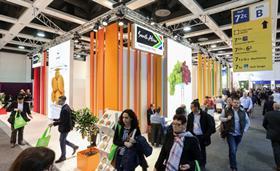
South African fruit exporters will converge on Berlin in 2016 for the thirteenth time since the country first introduced its pavilion at Fruit Logistica in 2002 and, motivated by strong exports in 2015, they will hope to build relationships with their international partners to increase business even further this year.
At the top of the agenda will be the search for new export opportunities, not only in Europe but also around the world, in order to sustain organic growth in production back home.
During the past few years the South African fruit business has transformed itself, mainly due to the arrival of new and exciting varieties which are boosting production and bringing about a new offering to the world’s buyers.
With currency benefits in the country’s traditional export markets being what they are, it is unlikely that South Africa’s fixation on the UK and Europe will end. Even with the US dollar at its peak against the South African rand, the eastern markets can just not match returns from Europe.
The apple and pear sector is concluding an excellent season, with volumes back to what they were two years ago, while the citrus industry exported some 188m cartons very successfully in 2015 – in a year when everyone initially predicted major problems – while the table grape sector is busy harvesting one of its highest-quality crops ever.
Those heading for Fruit Logistica in Berlin will therefore do so with much confidence. Aside from the exporters who will congregate at the South African pavilion, there are others who prefer to run their own stalls or who have teamed up with their partners in Europe.
Among those who will have a special conference room at the SA Pavilion this year is the PPECB, the country’s official quality standard company.
“The event has grown to such an extent that it has become one of the PPECB’s main platforms for stakeholder engagement sessions,” says marketing and communications manager Tina-Louise Rabie. As a result, the PPECB has, for the first time, applied for a private meeting room on the South African pavilion.
“Fruit Logistica provides a key opportunity for the PPECB to promote its services to both the local and international markets and to engage with importers and South African exporters alike. Furthermore, by securing a private meeting space, the PPECB hopes to enhance the effectiveness of these engagements and provide stakeholders with the opportunity to discuss any pertinent issues,” adds Rabie.
While trade with Europe will dominate, South Africa will also be keen to look at opportunities to return its sales in Russia to the levels of a few years ago. At the end of the 2015 season fresh produce trade between South Africa and Russia was down 15 per cent compared to the previous season.
Well-known industry expert Mikhail Fateev, head of the Food and Agriculture Sector of the Russia-South Africa Business Council, says that despite Russia’s economic situation, the credit crunch and the sanctions in Europe, strong relations between the South African fruit industry and the Russian fruit import business have survived the storms.
“However, despite the promises of commitments on meetings between the two country’s presidents, requirements to identify individual cartons are hampering trade,” Fateev notes.
“As a result of these technical barriers the year 2015 ended with at least a 15 per cent decrease in fruit trade between South Africa and Russia,” he adds. “Decisions of the two presidents to increase the supply of fruits from South Africa to Russia are still to be fulfilled.”



